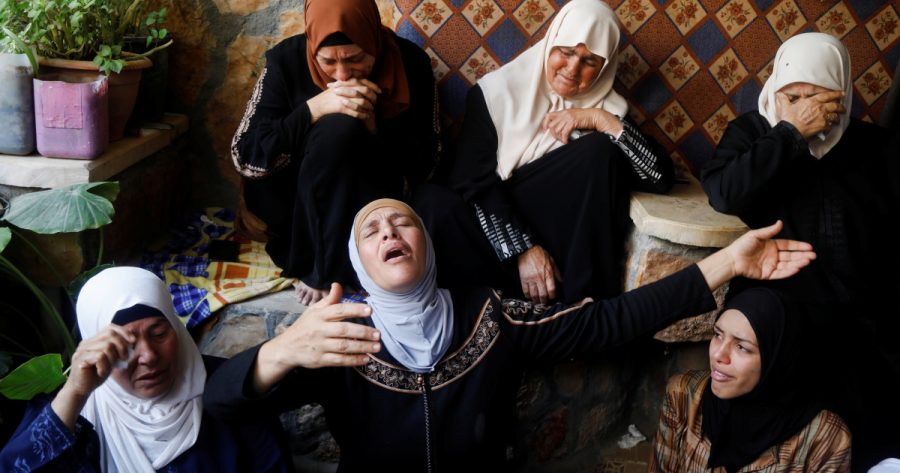A complicated history: an overview of the Israel/Palestine conflict
Diving into the history of the two independent states and why the conflict persists today
Photo courtesy of aljazeera.com (REUTERS/Raneen Sawafta))
Palestinian women mourn the loss of relatives on May 12
May 23, 2021
A cease-fire was reached last week between Israeli forces and Palestinian forces in East Jerusalem after days of violent fighting between the two sides which resulted in deaths of hundreds between the two nations.
With recent violent events unfolding in Israel and Palestine, understanding the history of the conflict and how it is still prevalent today holds the utmost importance when learning about the complex issue. Below is a overview of the history between the two independent states leading into recent events:
The History
The unrest between Israel and Palestine is a 100-year-old issue that began with Britain gaining control of what was then known as Palestine after the Ottoman Empire lost control in World War I according to information provided by History.
Britain was issued a document that allowed them administrative control over Palestine, which included establishing the region as a homeland for Jews. At the time, Palestine was inhabited by an Arab majority and a Jewish minority.
By 1947, a plan to partition Palestine into two independent states, one for Arabs, and one for Jews, was proposed by the United Nations. Jerusalem, which was claimed by both ethnic groups, would become an international city under this proposal.
Although this plan was accepted by Jews, Palestinian Arabs opposed this because they were previously fighting Jewish and British interests in their region. Arabs argued that since they were the majority of the population, they should be granted more territory.
Less than a year after the partition plan was proposed, Israel became an independent state with the withdraw of British influence, but Arab groups made moves to prevent the establishment of Israel because it implied that they were in favor of the partition plan.
The Arab-Israeli war soon followed in 1948, and by it’s end in 1949, Israel controlled more than two-thirds of the former British controlled region. Jerusalem was divided between Jordinian forces in the east, who occupied Egypt, the Gaza Strip and West Bank, and Israeli forces in the West. This regional conflict presented new struggles for Jews and Arabs, both political and economic.
Israel launched an airstrike on June 5, 1967, which destroyed 90 percent of Egypt’s air force. Within three days, Israel gained control over the Gaza Strip, the Sinai Peninsula and the West Bank. The events came to be known as the Six-Day War.
In response to Israel continuing to occupy the West Bank and the Gaza Strip, Palestine revolted in 1987, known as the First Intifada, which resulted in hundreds of deaths. Consequently, the Oslo Peace Accords were initiated in an attempt to put an end to the violence that had ensued for decades. The Palestinian and Israeli leaders signed the agreement in 1993. The Oslo Accords ultimately failed in bringing peace between the two independent states.
The Second Intifada occurred in September of 2000, which was triggered by a right-wing Jewish Israeli Ariel Sharon visiting the Al-Aqsa Mosque, a religious sanctuary. Many Arab Palestinians felt that this was offensive and began protesting. The protests escalated into suicide bombings and riots. This violence lasted nearly five years, and by August 2005, Israel withdrew from Gaza after the death of Yasser Arafat, the Palestinian leader.
Current Events Between Israel and Palestine
In mid-April, during Islam’s holy month known as Ramadan, Israel put barriers around Damascus Gate where Muslims gather to worship at Al-Aqsa Mosque. Palestinians protested but were met with police using stun grenades and Israeli nationalists hurling objects at the crowd, according to the New York Times.
Four Palestinian families faced eviction in legal cases in Sheikh Jarrah, located in east Jerusalem, but the cases that were expected to be heard in front of Israel’s Supreme Court were postposed because of the protesting. Jewish settlers began building houses in the land occupied by Palestinian families for decades, which has resulted in international criticism and controversy.
Hamas, a Palestinian militant group who currently controls the Gaza Strip, responded to Jewish settlers in Jerusalem evicting Palestinians by sending rockets into Jerusalem and other cities in Israel to which Israel responded with a series of airstrikes in the Gaza Strip. It is estimated that more than 67 people were killed in Gaza as a result of the airstrikes and 10 Israeli deaths from the rockets launched by Hamas.
Global protests continued to erupt in response to the violence in the two independent states, which raises questions of human rights violations and ethnic cleansing in Palestine. Some people are beginning to put pressure on outside nations to condemn Israel’s actions while others side with Israel’s attempts at self-defense. A cease-fire was reached last week, although tensions still rage around Eastern Jerusalem. The US sent Secretary of State Antony Blinken in support of the cease-fire “and to help organize a U.N.-led effort to bring humanitarian aid and reconstruction to bomb-ravaged Gaza,” according to the Washington Post.







Amy Shafer • May 28, 2021 at 9:58 am
Hi Miss Collins,
I have a particular interest in the history of this issue and truly appreciate your reporting! It was not only on point, your writing also provided a specific and insightful way to understand this age-old clash between the two states. Thank you for shining a light on this relevant discussion.